အာဗြဟာမ်
| အာဗြဟာမ် (Abraham) | |
|---|---|
 Abraham Serving the Three Angels, by Rembrandt, 1646 | |
| အိန်ထံင် |
|
| ကောန်ဇာတ် |
|
| ကောဒေအ် |
|
| သ္ၚိကၟိန် | လၟေင်တၞောဝ်အာဗြဟာမ် |
အာဗြဟာမ် (Abraham)[lower-alpha ၁] (တမ်မူလ အာဗြာမ် (Abram))[lower-alpha ၂] ဝွံ ဒှ်မၞိဟ်တမ်မူလ တၞောဝ်သာသနာ အာဗြဟာမ်ဂမၠိုင် မပ္တံကဵု ဘာသာ ဂျူ၊ ခရေတ်ယာန် ကေုာံ အေဿလာမ်တအ်ရ။[၁] ပ္ဍဲကဵု ဘာသာဂျူမ္ဂး ညးဝွံ ဒှ်မၞိဟ် မအံက်မခၞံဗဒှ် ပညပ်ဂမၠိုင်၊ ဗွဲတၟေင် ဒှ်မၞိဟ် မဆက်စၠောအ် အကြာ ကောန်ဂကူ ဟေပြာဲ (Hebrews) ကေုာံ ကျာ်ထာဝရ၊ ပ္ဍဲခရေတ်ယာန်မ္ဂး ညးဝွံ ဒှ်အစာမ်ခိုဟ် သွက်ညးမလျိုင်ပတှ်ေတအ် သီုဖအိုတ်၊ ပ္ဍဲအေဿလာမ်မ္ဂး ညးဝွံ ဒှ်ပရောဗက်မွဲဇကု ပ္ဍဲကဵု ပရောဗက်ဂမၠိုင် မစနူကဵု အာဍာမ် (Adam) မအိုတ် ပ္ဍဲ မူဟာမ်မေဒ် ( Muhammad) ရ။[၂]
ပရူ မချူလဝ် ပ္ဍဲသၠပတ်ပဌမကဝ်ဂှ်မ္ဂး ဒှ်ပရူ ဗီုတၞောဝ်ဗဳဇဂမၠိုင် မစေန်ဆက်ကၠုင် ကေုာံ ပရူတိဍာ်ရ။ ပ္ဍဲကဵု သၠပတ်ဂှ် ကျာ်ထာဝရ ဟီုကဵု အာဗြဟာမ် သွက်ဂွံတိတ်အာ နူကဵု သ္ၚိမအံက်ညးတေအ် တေရ (Terah) တုဲ ဖအောဝ် ကဵုအာပဒတဴ ပ္ဍဲ ဒၞာဲတိ နူကိုပ်ကၠာတေအ် မကဵုလဝ် ခါနာန်(Canaan) ဆဂး လၟုဟ် တိဂှ် ကျာ်ထာဝရ ပအပ်ကဵု (ဝါ) ကဵုပျးဒိုဟ် ကုအာဗြဟာမ် ကေုာံ တၞောဝ်ဒတောဝ်ညးတေအ်ရ။ ကြဴနူ အာဗြဟာမ်တုဲ ဆက်ပဒတဴအာ ပ္ဍဲတိဒၞာဲဂှ် ဂၠိုင်ကဵုတၞောဝ်၊ အတိုင်ပျးဒိုဟ်ကျာ်မ္ဂး ဣသှမေလ (Ishmael) ပတန်ဍုင်ဇၞော်မွဲရ။ ဣဇက် (Isaac) မဒှ်ကော န်အာဗြဟာမ် မကလိဂွံ နူကဵု သာရာ (Sarah) မဒှ် ကောန်မွဲအပါ ၜါယာဲ ကုအာဗြဟာမ်ဂှ် ဂွံဆက်ဒုင်ကေတ်အာဲကၟာဲဂှ်ရ။ အာဗြဟာမ် ရာန်ကေတ် ဂိုဟ် (ထီု ပ္ဍဲကဵု ပတြိရာဇ် (Cave of the Patriarchs) ပ္ဍဲဟေဗြောန် (Hebron) သွက်ဂွံတိုပ်ဇွ သာရာ၊ အရာဏအ်ဂှ် ပကဵု အခေါင်ညးမပိုင်ပြဳ တိဗ္ၚဂှ်ရ။ တၞောဝ်ညးဒုတိယ ညးမဆက်ဒုင်အာဲညး ဣဇက်ဂှ် ပသ္ၚိကၟိန် ကုတၞောဝ်ဒတောဝ်ညးတုဲ ဆက်ပကင်ရင်အာ ရးခါနာန် မဂၠိုင်ကဵုတၞောဝ်ရ။ အာဗြဟာမ်ဂှ် သမ္ဘာဇကု သာရာ ဟွံမဲတုဲ ဗွဲကြဴ ပသ္ၚိကၟိန် ကု ကေတုရ (Keturah) တုဲ ဆက်ကလိဂွံ ကောန်တြုဟ် တြဴ၊ ဆဂး အခိင်ကာလ ညးမစုတိဂှ် ဇွညးဂှ် အာတိုပ်လဝ် ဗဒါဲဇွသာရာ၊ တုဲပၠန် ဒြပ်ရတ်အာဲကၟာဲ အာဗြဟာမ် ဆမနွံဂှ် ဣဇက် ကလိဂွံ သီုဖအိုတ်တုဲ ကောန်တၞဟ်တအ်ဂှ် ကလိဂွံ ဆလာပ်သကာဟေင်ရ။ (သၠပတ်ပဌမကဝ် ၂၅:၅–၈).[၃]
ပရူဝင် အာဗြဟာမ်ဝွံ ဂွံဖျေဟ်အခိင်ကာလ ဗွဲမချိုတ်ပၠိုတ် ဟွံဂွံရ။ တုဲပၠန် မၞိဟ်ဗွဲမဂၠိုင် ဒုင်တဲစှ်ေစိုတ် ကတဵုဒှ်လဝ် ပ္ဍဲအခိင်ကာလသၠပတ် (patriarchal age) အကြာအခိင် မဗၠးတိတ် (exodus)တုဲ တၠပညာအစာဝင်ခေတ်တၟိတအ် ဖျေဟ်အခိင်ကာလ ဝင်မကတဵုဒှ်လဝ် ဇေတ်တ် ဗွဲမချိုတ်ပၠိုတ် ဟွံဂွံရ။[၄] လညာတ်တၠပညာဝင်လ္ၚဵု ဆိင်ခယျကေတ် ပရူဝွံ ကတဵုဒှ်လဝ် ကိုပ်ကၠာ ခေတ်ပါသဳ ( Persian period) (ကၞောတ် ၆ဗွဝ်ကၠံ ဘဳသဳ) မဒှ်အခိင်ကာလ ဂကူယုဍ (ဂျူ) ညးတၠတိ မပဒတဴဒၟံင် ပ္ဍဲ ရးယုဍ မဒးဒုင်ကြိုင်ကၟာတ်လဒဵုလဝ် ပ္ဍဲဗေဗဳလောန်တုဲ အာတ်မိက် ညံင်ညးတအ် ဂွံကလေင်အခေါင် တိဍာ်ညးတအ် နူကဵု လက်ထက် အာဗြဟာမ်၊ ကေုာံ အခိင် မဝ်သေဝ် (Moses) ပၠတရဴတုဲ တိတ်ဗၠးကၠုင် နူအဳဂျေပ်တုဲ ကလေင်အာ ဇရေင်တိဍာ် ကျာ်မကဵုလဝ် ပျးဒိုဟ်ဂှ်ရ။[၅]
ဝင်နူသၠပတ်
[ပလေဝ်ဒါန် | ပလေဝ်ဒါန် တမ်ကၞက်]
တမ်မူလ ကေုာံ ပၟိက်ဆန္ဒ
[ပလေဝ်ဒါန် | ပလေဝ်ဒါန် တမ်ကၞက်]တေရ မဒှ်မၞိဟ် တၞောဝ် မရနုက်ကဵု ဒစိတ် နူကဵု နဝ်ဨ (Noah) ဂှ် ဒှ်မအံက် ကောန်တြုဟ်ပိ၊ အာဗြာမ်၊ ဏာခေါဝ် (Nahor) ကေုာံ ခါရာန် (Haran)။ ဂကောံသ္ၚိကၟိန် အာဗြဟာမ် ကေုာံ ကောန်စဴညးဂှ် ပဒတဴကၠုင် ပ္ဍဲ ဥရ။ အတိုင်လိက်သၠပတ်midrashမ္ဂး အာဗြာမ်ဂှ် အခိင်ညးဍောတ်တ်တေအ် ကၠောန်ဒၟံင် ကမၠောန် ပ္ဍဲဖျာရုပ် မအံက်ညးတေရ။ ခါရာန်ဂှ် ဒှ်မအံက် လဝ်တ (Lot) ဟိုတ်ဂှ်ရ လဝ်တ ဂှ် ဒှ်ကောန်မေန် အာဗြာမ်ရ။ ခါရာန်ဂှ် စုတိအာ ပ္ဍဲကဵု ဌာန်တၟိုပ်သုက်ညး ဥရ ဂှ်ရ။
အာဗြာမ် ပသ္ၚိကၟိန် ကုသာရ မဒှ်ဗြဴခတန် ရ။ တေရ ကေုာံ အာဗြာမ်၊ သာရ (သာရာဲ Sarai)၊ ကေုာံ လဝ်တ တအ် တိတ်အာ ခါနာန်၊ ဆဂးညးတအ် စိုပ်ဍုင်င်ခါရာန် (Haran) တုဲ ပဒတဴ ပ္ဍဲဒၞာဲဂှ်ရ။ ပ္ဍဲဒၞာဲဂှ်ရ တေရ ကာလမကလိဂွံ အာယုက် ၂၀၅ သၞာံဂှ် စုတိအာရ။[သၠပတ်ပဌမကဝ် 11:27–32] ကျာ်ထာဝရ ဟီုကဵု အာဗြာမ် ကဵုတိတ်အာ နူကဵုဍုင်ဒတန် မိမကောဒေအ်ကလောဝေါင်သဇကု မပဒတဴတုဲ ကဵုအာ ဇရေင် ဒၞာဲကျာ်မထ္ၜးရ။ ကျာ်ကဵုလဝ်ဂတိပါင် ကျာ်သ္ဖန်ကဵု ညံင်ညးဂွံဒှ် ဂကူမၞိဟ်ဇၞော် ကေုာံ ကျာ်ပသေက်ပသဝ်တုဲ သ္ကဵုယၟုမၞိဟ်ဇၞော်ပရဲရောင်။ ကျာ်ဟီုလဝ် ကုအာဗြာမ် ကုမၞိဟ်မဒုင်မင်္ဂလ ကုအာဗြာမ်ဂှ် ကျာ်သ္ကဵုမင်္ဂလရောင်၊ ကုမၞိဟ် မချဴ အာဗြာမ်မ္ဂး ကျာ်သ္ချဴရောင်။ တုဲပၠန် သီုကျာ်ထာဝရ ကဵုလဝ်ညး သွက်ဂွံကဵုမ္ၚဵုမင်္ဂလ ကုဂကူမၞိဟ်တအ်ရ။[သၠပတ်ပဌမကဝ် 12:1–3] အခိင်ကာလ အာဗြာမ် ကေုာံ သမ္ဘာညး မိသာရာဲ ကောန်မေန်ညး လဝ်တ မတိတ် နူ ခါရာန်ဂှ် ညးကလိဂွံ အာယုက် ၇၅ သၞာံ။ ညးတအ်ဂှ် ကပေါတ်ကိရိယာဂမၠိုင် ကေုာံ ဝိညာဏ်ဓဝ်ပတှ်ေကျာ်ဂှ် တပ်အာ ဂၠံင် ခါနာန်ဂှ် ညးတအ် စိုပ်အာ သှေခေမ် (Shechem) ရ။[သၠပတ်ပဌမကဝ် 12:4–6]
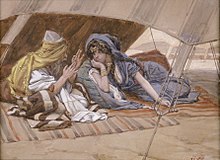
သာရာဲ
[ပလေဝ်ဒါန် | ပလေဝ်ဒါန် တမ်ကၞက်]ပ္ဍဲကဵု ရးခါနာန်ဂှ် ကပ်ကၞောဝ် ကတဵုဒှ်တုဲ အာဗြာမ်၊ လဝ်တ ကေုာံ ကပေါတ်သ္ၚိညးတအ်ဂှ် ဒဴတိတ်အာ ရးအာဲဂုပ္တု (အဳဂျေပ်)ရ။ ပ္ဍဲကဵုတရဴဂှ် အာဗြာမ် ဟီုကဵု သာရာဲ၊ ယဝ်ရ ကောန်အာဲဂုပ္တုတအ် တီ သာရာဲဂှ် ဒှ်သမ္ဘာညးမ္ဂး ညးအာဲဂုပ္တုတအ် သ္ဂစိုတ်ညးရောင်။ ဟိုတ်ဂှ်ရ ဟီုကဵုညးဂမၠိုင် ဗှ်ေဂှ် ဒှ်ၝောဲအဲညိ။[သၠပတ်ပဌမကဝ် 12:10–13] ကာလညးတအ် မစိုပ် အာဲဂုပ္တုဂှ် အမာတ်ဒဴဗညာ ဨကရာဇ်ဖာရောဝ်တအ် ညာတ်ကေတ် စလးစရာဲ သာရာဲမကျေဝ်ဂေါဝ်တုဲ ညးတအ် ကော်ဏာ သာရာဲ သွက်ဂွံဆက်ကွာဲကဵု ဨကရာဇ်ဖာရောဝ်ရ။ စၞးသာရာဲဂှ် ညးတအ် သၠာဲကဵု ကပေါတ်ဂမၠိုင် ကုအာဗြာမ်ရ။ ဟိုတ်နူဂှ်တုဲဂှ် ကျာ်ထာဝရ ကဵုဒဏ် ကုဨကရာဇ်ဖာရောဝ် နကဵုယဲပလုက်၊ သွက်ဨကရာဇ်ဖာရောဝ် ဂွံတီ မုညးကၠောန်ဗၠေတ်ရ။[သၠပတ်ပဌမကဝ် 12:14–17]ကာလ ဨကရာဇ်ဖာရောဝ် မတီကေတ် ဒဒှ်ရ သာရာဲဂှ် မၞိဟ် မနွံကဵုသ္ၚိကၟိန်တုဲ ညးကလေင်ကဵု သာရာဲ ကုအာဗြာမ်တုဲ သီုကဵုကပေါတ်တအ်ဂှ် ညးသၠးကဵုတုဲ ညးကဵုတိတ်အာရ။[သၠပတ်ပဌမကဝ် 12:18–20]
အာဗြာမ် ကေုာံ လဝ်တ ပြးသြာဲ
[ပလေဝ်ဒါန် | ပလေဝ်ဒါန် တမ်ကၞက်]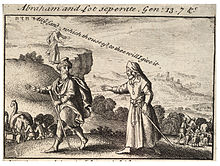
ကြဴနူ အာဗြာမ် ကေုာံ လဝ်တ မကလေင်စိုပ်ကၠုင် ဒၞာဲ အကြာ ၜေထလ (Bethel) ကေုာံ အာဣ (Hai)ဂှ် ပ္ဍဲညးတအ် ဒြပ်ဂၠိုင်ဗွဲမလောန်တုဲ ညးတအ် မံင်မွဲဒၞာဲဓဝ် ဟွံရုမ်ဂပ်တုဲ ဒးသေက်ဇဵု ရေင်သကအ်အိုတ်ရ။ အာဗြာမ်ဟီု ပိုယ်တအ်ဂှ် သွက်ဂွံဒှ် ကယျာန်ဓဝါတ် ရေင်သကအ် ပၟိက်ဟွံမဲ။ ဟိုတ်ဂှ်ရ ညးကဵုအခေါင် ကုလဝ်တ သွက်ဂွံရုဲစှ် အာဂၠံင်တဲဇွိဟာ အာဂၠံင်တဲသတုံဟာရ။ လဝ်တ ရုဲစှ်ကေတ် လပါ်တဲဇွိတုဲ ညးတိတ်အာ ဂၠံင်ဗမံက် ဇရေင်သြင်ၜဳယဝ်ဍာန် (Jordan River) မဒှ်ဒၞာဲ တိဍာ်ခိုဟ် စဵုကဵုစိုပ် ဍုင်ဇဝ်ရ မတုပ််ညံင်ရဴ ကၠံကျာ်ထာဝရကီုရ။ ညးတေအ် ပဒတဴ ပ္ဍဲကဵုဍုင် သောဝ်ဍောမ် (Sodom) ကဵု ဍုင်ဂေါဝ်မောဝ် (Gomorrah) ရ။ အာဗြာမ် တိတ်အာ လပါ်ဒိုဟ်သၠုင်ကျာ ဇရေင်ဍုင် ဟေဗြောန် (Hebron) တုဲ ပဒတဴ ပ္ဍဲဂြိုပ် မာံရေ (Mamre)၊ ပ္ဍဲဒၞာဲဂှ် ညးဒက်ပ္တန် ပၞင်ယဇ် သွက်ဂွံပူဇဴကျာ်ရ။[၆]
ခေဍဝ်ရလဝ်မာ (Chedorlaomer)
[ပလေဝ်ဒါန် | ပလေဝ်ဒါန် တမ်ကၞက်]
ပ္ဍဲအခိင် သပုန်ကတဵုဒှ် ပ္ဍဲဍုင်သောဝ်ဍောမ် ကဵု ဍုင်ဂေါဝ်မောဝ် မဒစဵုဒစး ကုသၟိင်ဨလာံ (Elam)ဂှ်[သၠပတ်ပဌမကဝ် 14:1–9] ကောန်မေန်အာဗြာမ် လဝ်တဂှ် ဒးဒုင်ရပ်ရ။ ကောန်ပၞာန်ဨလာံတအ်ဂှ် ကြဴနူဇမၞးကေတ် ကောန်ပၞာန် သၟိင်ဇၞော်သောဝ်ဍောမ် (Sodom's armies)တုဲ လုပ်သီကေတ် ဒြပ်ရတ်တအ်ရ။[သၠပတ်ပဌမကဝ် 14:8–12] ပ္ဍဲအခိင်ဂှ် လဝ်တ ကေုာံ ဂကောံသ္ၚိကၟိန်ညးတေအ် ပဒတဴဒၟံင် ပ္ဍဲကဵုတာဲ ပ္ဍဲဍုင်သောဝ်ဍောမ်ရ။[သၠပတ်ပဌမကဝ် 13:12]
မၞိဟ်မွဲ ဒြေပ်ဒဴတိတ် နူကဵုခရိုင်ဂှ်တုဲ ကၠုင်လဴဗ္စ ပရူဒဒှ် မကတဵုဒှ်လဝ်အိုတ်သီု ကုအာဗြာမ်ရ။ အာဗြာမ် ဂွံမိင်ကေတ် ပရိုင်ဂှ်တုဲ ဗွဲမပြဟ်ဟေင် ညးပကောံကေတ် မၞိဟ်မဒုင်ဒၠောအ်ဗတောန် ၃၁၈ တၠရ။ ပၞာန်အာဗြာမ် တပ်အာလပါ်သၟဝ်ကျာ ဒၞာဲပၞာန်သၟိင်ဨလာံ မနွံတေအ်ရ။ ပ္ဍဲအခိင်ဂှ် ပၞာန်သၟိင်ဨလာံဂှ် ဂွံဇၞးကေတ်လဝ် ပၞာန်သၟိင်ဇၞော်သောဝ်ဍောမ်တုဲတုဲရ။ ကာလပၞာန်အာဗြာမ် မစိုပ် ဒၞာဲပၞာန်သၟိင်ဨလာံ မနွံ ပ္ဍဲဍုင်ဍာန် (Dan) ဂှ် အာဗြာမ် ပါ်ထောအ် မၞိဟ်ဇကု ၜါက္ဍိုပ်တုဲ ပ္ဍဲအခိင်ဗတံဂှ် လုပ်ဗတိုက်ပလီုပလာ်တုဲ စဵုကဵု ဍုင်ဟောဝ်ၜ မနွံလပါ်တဲဇွိ (လပါ်သၟဝ်ကျာ) ဍုင်ဍမာသကု (Damascus) ဂှ်ဗက်ပၠန်ရ။ ဒြပ်ဗ္စဲသတြုတအ် မသီဏာ ဆမနွံဂှ်လေဝ်ကီု၊ ကောန်ကောဇကု လဝ်တ ကဵု ဒြပ်ညးဂှ်လေဝ်ကီု မၞိဟ်ဗြဴဂမၠိုင် ကဵု မၞိဟ်တြုဟ်ဂမၠိုင်တအ်ဂှ်လေဝ်ကီု ကလေင်ကလိဂွံသီုဖအိုတ်ရ။[သၠပတ်ပဌမကဝ် 14:13–16]
အခိင်ကာလ အာဗြာမ် မကလေင်ကၠုင်ဂှ် သၟိင်သောဝ်ဍောမ် တိတ်ကၠုင်ဒုင်တၠုင်ညး ပ္ဍဲခလံက်သၟိင်ဇၞော် မကော်ဂး ခလံက်သှာဝေ (Valley of Shaveh) ရ။ သၟိင်ဇၞော်မေလခဳဇေဍေက် (Melchizedek) မဒှ်ယဇ်ပရောဟိတ်ကျာ် မသၠုင်အိုတ်ဂှ်လေဝ် ပလံင်ပ္တိတ် ကွာင် ကဵု ဍာ်ဇဗျေတ်တုဲ၊ ကျာ်ဂမျိုင် ကဵုမ္ၚဵုမင်္ဂလ ကုအာဗြာမ်ရ။ အာဗြာမ်လေဝ် ဒြပ်ဆမနွံတအ်ဂှ် စှ်စွံမွဲစွံ ကဵုဒါန် ကုသၟိင်ဇၞော်မေလခဳဇေဍေက်ရ။ သၟိင်ဇၞော်သောဝ်ဍောမ် အာတ် အာဗြာမ် ယဝ်ရမၞိဟ်ညးဂှ် ကလေင်ကဵုညးမ္ဂး ဒြပ်မသီဂွံလဝ်ဂှ် ညးပအပ်ကဵု သီုဖအိုတ်ရ။ အာဗြာမ် တးပါဲ တင်အာတ်မိက် နူသၟိင်သောဝ်ဍောမ် သီုဖအိုတ်ရ၊ ဆဂး ညးပါ်ပရအ် သွက်ဂွံဒှ် မဟာမိတ်ရေင်သကအ်ရ။[သၠပတ်ပဌမကဝ် 14:17–24]

ဂလာန်ပယျးဒိုဟ်
[ပလေဝ်ဒါန် | ပလေဝ်ဒါန် တမ်ကၞက်]ဂလာန်ပယျးဒိုဟ် နူကျာ်ဂမျိုင် ဟီုဗြုကၠုင် ကုအာဗြာမ် ဒဒှ်ရ မွဲဝါပၠန် ကျာ်ဂမျိုင် ကဵုဂတိပါင် သွက်တိဍာ် ကေုာံ တၞောဝ်ဒတောဝ်ညး သဂၠိုင်ဂၠေင် မရိုဟ်လၟိဟ်ဟွံမာန် ညံင်ရဴသၞံင် လတူအကာသရ။ အာဗြာမ် ကေုာံ ကျာ်ဂမျိုင် ဒက်ကတ္ထိက ရေင်သကအ်တုဲ ကျာ်ဂမျိုင် လဴကဵု ပရူအနာဂတ် ဘဝဍိက်အေသရေလ ပ္ဍဲအာဲဂု။ တိရး ညးမကဵုလဝ်ဂတိပါင်ဂှ် တိရး မၞိဟ်ကေနိ (Kenites)၊ မၞိဟ်ကေနဇိ (Kenizzites)၊ မၞိဟ်ကာဍမောဝ်နိ (Kadmonites)၊ မၞိဟ်ဟိတ္တိ (Hittites)၊ မၞိဟ်ဖေရဇိ (Perizzites)၊ မၞိဟ်ရေဖိမ် (Rephaims)၊ မၞိဟ်အာမောရိ (Amorites)၊ မၞိဟ်ခါနနိ (Canaanites)၊ မၞိဟ်ဂိရဂါဟှိ (Girgashites)၊ ကေုာံ မၞိဟ်ယေၜုသိ (Jebusites) တအ်ရ။[သၠပတ်ပဌမကဝ် 15:1–21]
ဟာဂရ
[ပလေဝ်ဒါန် | ပလေဝ်ဒါန် တမ်ကၞက်]
အာဗြာမ် ကေုာံ သာရာဲ ညးၜါဝွံ ပံင်ဖက်ကၠုင်ရေင်သကအ် ပ္ဍဲခါနာန် လုကဴစှ်သၞာံတုဲရကီုလေဝ် ဆကောန်မွဲကီု ဟွံကလိဂွံမ္ဂး ဗီုလဵုဂွံဒှ် ညးမအံက်တၞောဝ်ဒတောဝ်မွဲမာန်ရောဂှ် ချပ်ဂၞန် ရေင်သကအ်ရ။ သာရာဲ ပအပ်ကဵု အာဗြာမ် ဍိက်ဗြဴဇကု ညးရးအာဲဂုပ္တ ဟာဂရ (Hagar) သွက်ဂွံကေတ် ယိုက်ဂဝ် ကောန်တြုဟ် အာဗြာမ်ရ။
After Hagar found she was pregnant, she began to despise her mistress, Sarai. Sarai responded by mistreating Hagar, and Hagar fled into the wilderness. An angel spoke with Hagar at the fountain on the way to Shur. He instructed her to return to the camp of Abram, and that her son would be "a wild ass of a man; his hand shall be against every man, and every man's hand against him; and he shall dwell in the face of all his brethren." She was told to call her son Ishmael. Hagar then called God who spoke to her "El-roi", ("Thou God seest me:" KJV). From that day onward, the well was called Beer-lahai-roi, ("The well of him that liveth and seeth me." KJV margin). She then did as she was instructed by returning to her mistress in order to have her child. Abram was 86 years of age when Ishmael was born.[သၠပတ်ပဌမကဝ် 16:4–16]
Sarah
[ပလေဝ်ဒါန် | ပလေဝ်ဒါန် တမ်ကၞက်]Thirteen years later, when Abram was 99 years of age, God declared Abram's new name: "Abraham" – "a father of many nations".[Genesis 17:5] Abraham then received the instructions for the covenant, of which circumcision was to be the sign.[Genesis 17:10–14]
God declared Sarai's new name: "Sarah", blessed her, and told Abraham, "I will give thee a son also of her".[Genesis 17:15–16] Abraham laughed, and "said in his heart, 'Shall a child be born unto him that is a hundred years old? and shall Sarah, that is ninety years old, bear?'"[Genesis 17:17] Immediately after Abraham's encounter with God, he had his entire household of men, including himself (age 99) and Ishmael (age 13), circumcised.[Genesis 17:22–27]
Three visitors
[ပလေဝ်ဒါန် | ပလေဝ်ဒါန် တမ်ကၞက်]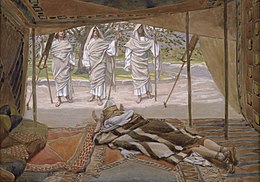
Not long afterward, during the heat of the day, Abraham had been sitting at the entrance of his tent by the terebinths of Mamre. He looked up and saw three men in the presence of God. Then he ran and bowed to the ground to welcome them. Abraham then offered to wash their feet and fetch them a morsel of bread, to which they assented. Abraham rushed to Sarah's tent to order cakes made from choice flour, then he ordered a servant-boy to prepare a choice calf. When all was prepared, he set curds, milk and the calf before them, waiting on them, under a tree, as they ate.[Genesis 18:1–8]
One of the visitors told Abraham that upon his return next year, Sarah would have a son. While at the tent entrance, Sarah overheard what was said and she laughed to herself about the prospect of having a child at their ages. The visitor inquired of Abraham why Sarah laughed at bearing a child at her age, as nothing is too hard for God. Frightened, Sarah denied laughing.
Abraham's plea
[ပလေဝ်ဒါန် | ပလေဝ်ဒါန် တမ်ကၞက်]
After eating, Abraham and the three visitors got up. They walked over to the peak that overlooked the 'cities of the plain' to discuss the fate of Sodom and Gomorrah for their detestable sins that were so great, it moved God to action. Because Abraham's nephew was living in Sodom, God revealed plans to confirm and judge these cities. At this point, the two other visitors left for Sodom. Then Abraham turned to God and pleaded decrementally with Him (from fifty persons to less) that "if there were at least ten righteous men found in the city, would not God spare the city?" For the sake of ten righteous people, God declared that he would not destroy the city.[Genesis 18:17–33]
When the two visitors got to Sodom to conduct their report, they planned on staying in the city square. However, Abraham's nephew, Lot, met with them and strongly insisted that these two "men" stay at his house for the night. A rally of men stood outside of Lot's home and demanded that Lot bring out his guests so that they may "know" (v.5) them. However, Lot objected and offered his virgin daughters who had not "known" (v.8) man to the rally of men instead. They rejected that notion and sought to break down Lot's door to get to his male guests,[Genesis 19:1–9] thus confirming the wickedness of the city and portending their imminent destruction.[Genesis 19:12–13]
Early the next morning, Abraham went to the place where he stood before God. He "looked out toward Sodom and Gomorrah" and saw what became of the cities of the plain, where not even "ten righteous" (v.18:32) had been found, as "the smoke of the land went up as the smoke of a furnace."[Genesis 19:27–29]
Abimelech
[ပလေဝ်ဒါန် | ပလေဝ်ဒါန် တမ်ကၞက်]
Script error: The module returned a nil value. It is supposed to return an export table. Abraham settled between Kadesh and Shur in the land of the Philistines. While he was living in Gerar, Abraham openly claimed that Sarah was his sister. Upon discovering this news, King Abimelech had her brought to him. God then came to Abimelech in a dream and declared that taking her would result in death because she was a man's wife. Abimelech had not laid hands on her, so he inquired if he would also slay a righteous nation, especially since Abraham had claimed that he and Sarah were siblings. In response, God told Abimelech that he did indeed have a blameless heart and that is why he continued to exist. However, should he not return the wife of Abraham back to him, God would surely destroy Abimelech and his entire household. Abimelech was informed that Abraham was a prophet who would pray for him.[Genesis 20:1–7]
Early next morning, Abimelech informed his servants of his dream and approached Abraham inquiring as to why he had brought such great guilt upon his kingdom. Abraham stated that he thought there was no fear of God in that place, and that they might kill him for his wife. Then Abraham defended what he had said as not being a lie at all: "And yet indeed she is my sister; she is the daughter of my father, but not the daughter of my mother; and she became my wife."[Genesis 20:12] Abimelech returned Sarah to Abraham, and gave him gifts of sheep, oxen, and servants; and invited him to settle wherever he pleased in Abimelech's lands. Further, Abimelech gave Abraham a thousand pieces of silver to serve as Sarah's vindication before all. Abraham then prayed for Abimelech and his household, since God had stricken the women with infertility because of the taking of Sarah.[Genesis 20:8–18]
After living for some time in the land of the Philistines, Abimelech and Phicol, the chief of his troops, approached Abraham because of a dispute that resulted in a violent confrontation at a well. Abraham then reproached Abimelech due to his Philistine servant's aggressive attacks and the seizing of Abraham's well. Abimelech claimed ignorance of the incident. Then Abraham offered a pact by providing sheep and oxen to Abimelech. Further, to attest that Abraham was the one who dug the well, he also gave Abimelech seven ewes for proof. Because of this sworn oath, they called the place of this well: Beersheba. After Abimelech and Phicol headed back to Philistia, Abraham planted a grove in Beersheba and called upon "the name of the ထာမ်ပလိက်:LORD, the everlasting God."[Genesis 21:22–34]
Isaac
[ပလေဝ်ဒါန် | ပလေဝ်ဒါန် တမ်ကၞက်]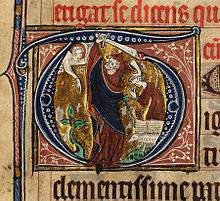
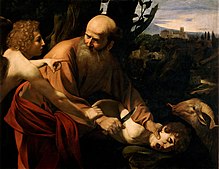
As had been prophesied in Mamre the previous year,[Genesis 17:21] Sarah became pregnant and bore a son to Abraham, on the first anniversary of the covenant of circumcision. Abraham was "an hundred years old", when his son whom he named Isaac was born; and he circumcised him when he was eight days old.[Genesis] For Sarah, the thought of giving birth and nursing a child, at such an old age, also brought her much laughter, as she declared, "God hath made me to laugh, so that all who hear will laugh with me."[Genesis] Isaac continued to grow and on the day he was weaned, Abraham held a great feast to honor the occasion. During the celebration, however, Sarah found Ishmael mocking; an observation that would begin to clarify the birthright of Isaac.[Genesis 21:8–13]
Ishmael
[ပလေဝ်ဒါန် | ပလေဝ်ဒါန် တမ်ကၞက်]Script error: The module returned a nil value. It is supposed to return an export table. Ishmael was fourteen years old when Abraham's son Isaac was born to Sarah. When she found Ishmael teasing Isaac, Sarah told Abraham to send both Ishmael and Hagar away. She declared that Ishmael would not share in Isaac's inheritance. Abraham was greatly distressed by his wife's words and sought the advice of his God. God told Abraham not to be distressed but to do as his wife commanded. God reassured Abraham that "in Isaac shall seed be called to thee."[Genesis 21:12] He also said that Ishmael would make a nation, "because he is thy seed".[Genesis 21:9–13]
Early the next morning, Abraham brought Hagar and Ishmael out together. He gave her bread and water and sent them away. The two wandered in the wilderness of Beersheba until her bottle of water was completely consumed. In a moment of despair, she burst into tears. After God heard the boy's voice, an angel of the Lord confirmed to Hagar that he would become a great nation, and will be "living on his sword". A well of water then appeared so that it saved their lives. As the boy grew, he became a skilled archer living in the wilderness of Paran. Eventually his mother found a wife for Ishmael from her home country, the land of Egypt.[Genesis 21:14–21]
Binding of Isaac
[ပလေဝ်ဒါန် | ပလေဝ်ဒါန် တမ်ကၞက်]
At some point in Isaac's youth, Abraham was commanded by God to offer his son up as a sacrifice in the land of Moriah. The patriarch traveled three days until he came to the mount that God told him of. He then commanded the servants to remain while he and Isaac proceeded alone into the mount. Isaac carried the wood upon which he would be sacrificed. Along the way, Isaac asked his father where the animal for the burnt offering was, to which Abraham replied "God will provide himself a lamb for a burnt offering". Just as Abraham was about to sacrifice his son, he was interrupted by the angel of the Lord, and he saw behind him a "ram caught in a thicket by his horns", which he sacrificed instead of his son. For his obedience he received another promise of numerous descendants and abundant prosperity. After this event, Abraham went to Beersheba.[Genesis 22:1–19]
Later years
[ပလေဝ်ဒါန် | ပလေဝ်ဒါန် တမ်ကၞက်]Script error: The module returned a nil value. It is supposed to return an export table. Sarah died, and Abraham buried her in the Cave of the Patriarchs (the "cave of Machpelah"), near Hebron which he had purchased along with the adjoining field from Ephron the Hittite.[Genesis 23:1–20] After the death of Sarah, Abraham took another wife, a concubine named Keturah, by whom he had six sons: Zimran, Jokshan, Medan, Midian, Ishbak, and Shuah.[Genesis 25:1–6] According to the Bible, reflecting the change of his name to "Abraham" meaning "a father of many nations", Abraham is considered to be the progenitor of many nations mentioned in the Bible, among others the Israelites, Ishmaelites,[Genesis 25:12–18] Edomites,[Genesis 36:1–43]) Amalekites,[Genesis 36:12–16] Kenizzites,[Genesis 36:9–16] Midianites and Assyrians,[Genesis 25:1–5] and through his nephew Lot he was also related to the Moabites and Ammonites.[Genesis 19:35–38] Abraham lived to see his son marry Rebekah, (and to see the birth of his twin grandsons Jacob and Esau). He died at age 175, and was buried in the cave of Machpelah by his sons Isaac and Ishmael.[Genesis 25:7–10][1 Chronicles 1:32]
Notes
[ပလေဝ်ဒါန် | ပလေဝ်ဒါန် တမ်ကၞက်]Bibliography
[ပလေဝ်ဒါန် | ပလေဝ်ဒါန် တမ်ကၞက်]နိဿဲ
[ပလေဝ်ဒါန် | ပလေဝ်ဒါန် တမ်ကၞက်]- ↑ McCarter 2000.
- ↑ Levenson 2012.
- ↑ Ska 2009, pp. 26–31.
- ↑ McNutt 1999, pp. 41–42.
- ↑ Ska 2006, pp. 227–228, 260.
- ↑ "Abram and Lot Separate", Chabad.org
